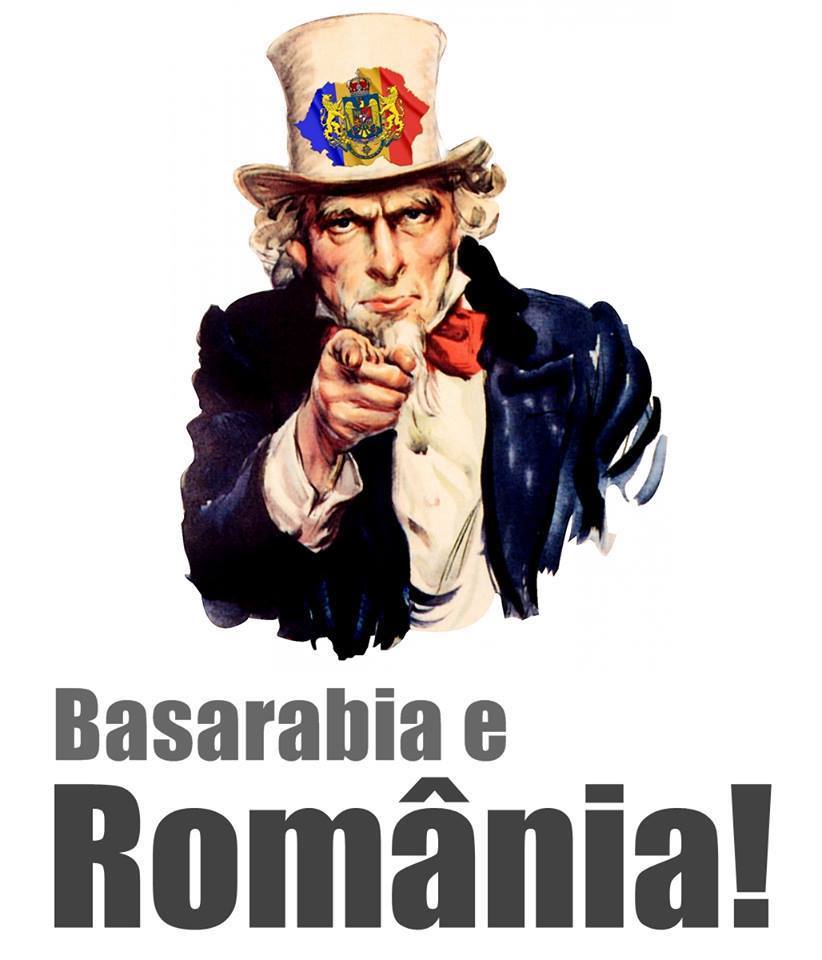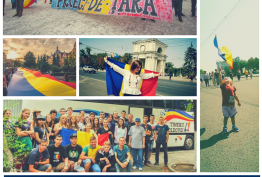29 august 2016, București / 2016, August 29, Bucharest
Către Secretarul de Stat al Statelor Unite ale Americii,
Excelența Sa, Domnul John Kerry
Excelență,
Interviul colegului Dvs., Ambasadorul Extraordinar și Plenipotențiar al Statelor Unite ale Americii în Republica Moldova, Excelența Sa, Domnul James Pettit, acordat postului public de televiziune de la Chișinău în data de 28 August 2016, în care s-a pronunțat pe o temă foarte sensibilă pentru cetăţenii celor două state românești, ReUnirea Republicii Moldova cu România, a declanșat o stare de profundă îngrijorare faţă de politica SUA ca partener strategic al României.
Afirmațiile Domnului Ambasador James Pettit perpetuează o serie de întreagă de mistificări datând din perioada dictaturii lui Iosif Stalin şi ar putea fi interpretate de mulţi ca o ofensă față de poporul român: "Consider că este foarte important şi aceasta desigur este politica noastră, cred că şi politica de aici, ca Moldova să rămână un stat suveran şi independent în interiorul unor graniţe sigure. Unirea cu România, de exemplu, ca o cale de a intra în UE sau orice alt motiv, nu este o alegere practică şi nu este o alegere care va face lucrurile mai bune aici, în Moldova. ... Moldova nu este România, Moldova își are propria sa istorie şi propriile provocări".
Vă rugăm să luaţi notă de faptul că şi să aduceți la cunoștința Preşedintelui SUA ca şi poporului american că populația majoritară din Republica Moldova este românească (73%), are aceeași origine, aceeași istorie, aceeași cultură și aceeași limbă ca populația românească din România. Este regretabil că un diplomat de rang înalt al SUA acreditat într-unul din cele două state românești nu cunoaște istoria românilor din România și din Republica Moldova. Altfel ar fi trebuit să ştie că nu din cauza exerciţiului propriei voinţe, ci din cauza intervențiilor repetate ale Marilor Puteri în ultimele două secole, românii trăiesc în două state: România și Republica Moldova.
Astfel:
-
1812 – În urma războiului dintre 1806 şi 1812 dintre Rusia și Imperiul Otoman partea estică a Principatului autonom al Moldovei, situată între râurile Prut și Nistru, a fost dată Rusiei de către Turcia. Noua provincie astfel creată primeşte numele de Basarabia, iar după anul 1821 guvernul ţarist introduce măsuri de interzicere a limbii şi culturii române.
-
1856 – Ca urmare a înfrângerii Rusiei în Războiul Crimeii (1853-1856), partea de sud a Basarabiei este retrocedată Principatului Moldovei.
-
1859 – Prin Unirea Principatelor Moldovei şi Valahiei se formează statul numit din 1866 România. Partea de sud a Republicii Moldova din zilele noastre a făcut parte din România încă de la fondarea sa.
-
1878 – Ca preţ al retragerii trupelor ruse după războiul ruso-româno-turc (1877-1878), al recunoaşterii independenţei şi a drepturilor României în Dobrogea, Rusia obligă România să cedeze teritoriul său de la est de Prut, care este reataşat provinciei Basarabia.
-
1905 – Ca urmare a primei revoluţii din Rusia, cultura română este din nou permisă în Basarabia şi se constituie o mişcare de emancipare naţională.
-
1918 - În contextul revoluţiei ruse din 1917 şi a afirmării principiului dreptului naționalităților, promovat de președintele SUA Woodrow Wilson, Basarabia se declară independentă şi apoi se reuneşte cu România, prin votul democratic al parlamentului.
-
1924 – Pentru a pregăti viitoarea expansiune în estul României, Uniunea Sovietică organizează o aşa-zisă republică autonomă moldovenească pe malul estic al Nistrului.
-
1939 - Prin Tratatul Ribentropp-Molotov, Germania lui Hitler și Uniunea Sovietică a lui Stalin au convenit împărțirea Europei de Est: statele baltice, Polonia de Est și o parte a României (Basarabia) au fost recunoscute de Hitler ca zone de expansiune pentru URSS. Basarabia, alături de alte două regiuni din estul României, a fost anexată cu forța de Uniunea Sovietică în 28 Iunie 1940, în contextul celui de-al doilea război mondial. La 2 august 1940, în timp ce o parte din teritoriile româneşti sunt alipite Ucrainei Sovietice, pe baza structurilor republicii autonome moldoveneşti este proclamată Republica Sovieitcă Socialistă Moldovenească, care include o parte din teritoriul acesteia şi cea mai mare parte a Basarabiei istorice.
-
1945 - Deși Basarabia a fost anexată de URSS prin forță pe baza tratatului Ribbentrop-Molotov şi în pofida participării României la războiul împotriva Germaniei naziste în perioada august 1944-mai 1945, în contextul alianței dintre SUA, Regatul Unit, Franța și Uniunea Sovietică, aceste mari puteri au decis ca Basarabia să rămână URSS, în dauna României, fapt consimţit prin Tratatul de pace de la Paris din 1947.
-
1989 – În contextul reformelor din URSS şi sub presiunea maselor populare, RSS Moldovenească revine la scrierea limbii române cu grafie latină, limba română este declarată oficială, iar teza stalinistă a unei limbi „moldoveneşti” separate, o mistificare evidentă, este denunţată ca atare. Era corolarul unor mişcări de rezistenţă şi emancipare care începuseră încă de la finele anilor 1940. În 1990, RSS Moldovenească îşi schimbă numele în Republica Moldova.
-
1991 – Ca urmare a destrămării Uniunii Sovietice Republica Moldova devine independentă, însă cu obiectivul declarat o dată cu independenţa de ReUnire cu România. Aceasta este blocată de către Rusia prin susţinerea unor mişcări separatiste, culminând cu războiul de pe Nistru din 1992, în care trupele ruse, aflate şi în prezent fără acordul Republicii Moldova în oraşul Tiraspol, intervin în mod direct.
-
2009 – În timpul revoluţiei Twitter din aprilie 2009 tinerii revoltaţi împotriva regimului comunist al preşedintelui Vladimir Voronin cer din nou ReUnirea Republicii Moldova cu România.
-
2016, august 28 – Ambasadorul Statelor Unite ale Americii, partenerul strategic al României, la Chişinău afirmă public că Moldova (care este constituită din teritorii care aparţin azi României, Republicii Moldova şi Ucrainei!) are propria sa istorie separată – exact ca în materialele de propagandă sovietică şi rusă – și nu agrează potenţiala ReUnire cu România.
Aşa cum se poate vedea mai sus, soarta românilor din Basarabia și apoi Republica Moldova a fost decisă arbitrar de Marile Puteri în 1812, 1878, 1939, 1945, 1991-1992 și (deşi sperăm să nu fie cazul) 2016. Atunci când românii moldoveni înşişi şi-au putut decide soarta, ca în 1859 şi 1918, aceasta a fost în favoarea unificării cu ceilalţi români şi nu a statalităţii separate.
În condițiile în care din ce în ce mai mulți cetăţeni ai ambelor state doresc Unirea Republicii Moldova cu România, declarația ambasadorului James Pettit are efecte politice și strategice incomensurabile. Cele mai recente sondaje de opinie efectuate în România indică faptul că 2 din 3 români își doresc ReUnirea. De asemenea, în Republica Moldova există o apetență spre Unificare de aproximativ 28%, iar procentul se dublează atunci când oamenii înțeleg efectele benefice ale acestui act. Unirea României cu Republica Moldova înseamnă reunificarea a două părți ale aceluiași popor, cu respectarea dreptului internațional și bazat pe voința democratică a celor două societăți.
Noi, românii, am înțeles din declarația ambasadorului SUA la Chișinău, dacă aceasta reprezintă cu adevărat poziţia Departamentului de Stat şi Administraţiei Prezidenţiale a Statelor Unite, că:
-
SUA nu agreează proiectul ReUnirii Republicii Moldova cu România într-un singur stat, ceea ce poate fi interpretat ca o interdicție.
-
SUA nu respectă sentimentele naționale ale românilor, deși România este aliatul și partenerul strategic al SUA, ceea ce poate pune la îndoială sinceritatea SUA în parteneriatul strategic cu România.
-
SUA susțin propaganda sovietică şi rusă pentru crearea unei identități artificiale a românilor din Republica Moldova, prin negarea românismului populației din Republica Moldova și clamarea artificială a unui ”popor moldovenesc” cu o altă istorie decât a românilor și cu o altă limbă, ”limba moldovenească”.
-
SUA au decis împărțirea Republicii Moldova prin recunoașterea unui statut special al regiunii transnistrene.
-
SUA desconsideră interesele naționale ale României şi Republicii Moldova în favoarea Rusiei.
Afirmațiile Domnului Ambasador James Pettit vor afecta imaginea SUA în România și în Republica Moldova, vor influența percepția publică despre sinceritatea parteneriatului strategic dintre SUA și România și vor declanșa o propagandă antiamericană în România. Românii nutresc o simpatie, o prietenie şi chiar o admiraţie sinceră faţă de Statele Unite şi poporul american.
Rugăm Excelența Voastră, în calitate de Secretar de Stat al SUA, să prezentați public sau să mandataţi pe Excelenţa Sa, Domnul Hans Klemm, Ambasadorul Statelor Unite în România, să prezinte poziția SUA în:
-
problema Unirii românilor din Republica Moldova și România într-un singur stat.
-
problema identității de neam, de istorie, de cultură și de limbă a populației românești din România și din Republica Moldova.
-
problema propagandei sovietice şi ruse despre ”poporul moldovenesc” și ”limba moldovenească”.
-
problema anulării integrale a efectelor Tratatului Ribentropp-Molotov.
-
problema regiunii transnistrene și a statutului său politic și administrativ.
Din propoziția Domnului Ambasador James Pettit ”aceasta desigur este politica noastră” înțelegem că aserțiunile Excelenței Sale sunt conforme cu politica SUA în regiune.
Vă aducem aminte că la începutul perioadei comuniste românii doreau să vină americanii ca să îi scape de sovietici și de comuniști. SUA au venit în România abia după 50 de ani, a devenit principalul aliat al României și a câștigat încrederea poporului român.
Sperăm că prețul acestui parteneriat strategic dintre SUA și România nu este părăsirea Republicii Moldova în sfera de influență a Rusiei și nici interdicția ReUnirii românilor într-un singur stat. Este un preț prea mare, pe care noi, ROMÂNII, nu vrem să îl plătim!
Noi, ROMÂNII, vă rugăm să exprimați public poziția SUA față de aceste probleme și să clarificați dacă SUA susține afirmațiile ambasadorului său la Chișinău, Excelența Sa, Domnului James Pettit.
Opened Letter
To the Secretary of State or the United States of America,
His Excellency, Mr. John Kerry
Your Excellency,
The interview of your colleague, the Extraordinary and Fully Empowered Ambassador of the United States in America in the Republic of Moldova, His Excellency, Mr. James Pettit, granted to the State television network in Chișinău on August 28, 2016, in which he referred to a very sensitive issue for the citizens of both Romanian speaking countries, the Reunion of the Republic of Moldova with Romania, triggered a state of profound worry toward the policies of the USA as the strategic partner of Romania.
The allegations of Mr. Ambassador James Pettit perpetuates an entire series of historical and cultural mistifications dating from the period of the dictatorship of Joseph Stalin and could be seen by many as an offense to the Romanian people: "I think it is very important and this of course is our politics, I think also the politics here that Moldova will remain a sovereign aind independent State within scured boundaries. The Union with Romania, as an example, cas a way to access the EU or for any other reason, is not a practical choice ans it is not a choice which will make things better here, in Moldova. ... Moldova is not Romania, Moldova has its own history and its own challenges".
Please acknowledge and let know also the President of the United States as well as the American people that the majority of the population of the Republic of Moldova is Romanian (73%), has the same origin, history, culture and laguage as the Romanian population of Romania. It is unfortunate that a high ranking diplomat of the USA serving in one of the two Romanian speaking countries has no knowledge of the history of the Romanians in Romania and the Republic of Moldova. Otherwise he should have been aware it was not due to the exercise of their democratic will, but it is due to the repeated interventions of the Great Powers during the past 2 centuries that the Romanians are living today in the 2 separate states: Romania and the Republic of Moldova.
As follows:
-
1812 – As a result of the war of 1806 to 1812 between Russia and the Ottoman Empire the Eastern part of the autonomous Principality of Moldova, between the rivers Prut and Dnister, was transferred to Russia by Turkey. The new province created as a result is named Bessarabia, and after 1821 the Czarist Government implements policies to ban the Romanian language and culture.
-
1856 – As a result of the defeat of Russia in the Crimean War (1853-1856), the Southern part of Bessarabia is given back to the Principality of Moldova.
-
1859 – Through the Union of the Principalities of Moldova and Wallachia is formed the state called since 1866 Romania. The Southern region of the present day Republic of Moldova was a constitutive part of Romania since its foundation.
-
1878 – Against the withdrawal of the armies after the Russian-Romanian-Turkish War (1877-1878), of the recognition of the independence and of the rights of Romania in Dobruja, Russia forces Romania to surrender its territory East of the river Prut, which is attached again to Bessarabia.
-
1905 – Following the first revolution of Russia, the Romanian culture is again allowed in Bessarabia and a national emancipation movement begins.
-
1918 – In the context of the Russian Revolution of 1917 and of the affirmation of the principle of the right of the nationalities promoted by the USA President Woodrow Wilson, Bessarabia declares itself independent and subsequently reunites with Romania, through the democratic vote of the revolutionary parliament.
-
1924 – To prepare the future expansion in the East of Romania, the Soviet Union sets up a so-called Moldovan autonomous republic on the Eastern bank of the Dnister.
-
1939 – Through the Ribentropp-Molotov Treaty, Hitler's Germany and Stalin's Soviet Union agree the partition of the Eastern Europe: the Baltic countries, Eastern Poland and a part of Romania (Bessarabia) were acknowledged by Hitler as expansion areas for the USSR. Bessarabia, together with other 2 regions in Eastern Romania, was forcefully annexed by the Soviet Union on June 28, 1940, in the context of World War II. On August 2, 1940, while some of the Romanian territories are included in the Soviet Ukraine, on the basis of the autnomous Moldovan republic is created the Moldovan Soviet Socialist Republic, which includes most a part of the territory of the former autonomous republic and most of the historical Bessarabia.
-
1945 - Although Bessarabia was annexed by the USSR forcefully based on the Ribbentrop-Molotov Treaty and against the participation of Romania to the war against the Nazi Germany between August 1944-May 1945, in the context of the alliance between the USA, the United Kingdom, France and the Soviet Union, these Great Powers agreed that Bessarabia will remain to the USSR, to the loss of Romania, which was confirmed by the Paris Peace Treaty 1947.
-
1989 – In the context of the reforms ongoing in the USSR and under the pressure of the masses, the Moldovan SSR adopts again the writing of the Romanian language with Latin alphabet, the Romanian language is declared the official language and the Stalinist thesis of a separate “Moldovan” language, an obvious mistification, is denounced as such. It was the climax of resistance and emancipation movements which started as early as the late 1940s. In 1990, the Moldovan SSR changes its name in the Republic of Moldova.
-
1991 – As a direct consequence of the fall of the Soviet Union the Republic of Moldova becomes independent, but with the intention announced the same time as the independence to reunite with Romania. The Reunion is blocked by Russia by supporting separatist movements, culminating with the 1992 War on Dnister, in which the Russian militaries, situated even today in the City of Tiraspol without the agreement of the Republic of Moldova, participate directly.
-
2009 – During the Twitter Revolution of April 2009 the youngsters revolted against the Communist regime of the President Vladimir Voronin demand again the Reunion of the Republic of Moldova with Romania.
-
2016, August 28 – The Ambassador of the United States of America, the strategic partner of Romania, in Chişinău publicly alleges that Moldova (which comprises in fact of territories belonging today to Romania, the Republic of Moldova and Ukraine!) has its own separate history – just like in the Soviet and Russian propaganda materials – does not agree with the potential Reunion with Romania.
As it can be concluded from the above, the fate of the Romanians from Bessarabia and later the Republic of Moldova was arbitrarily decided by the Great Powers in 1812, 1878, 1939, 1945, 1991-1992 and (although we hope this is not the case) 2016. When the Moldovan Romanians themselves were allowed to decide their fate, as in 1859 and 1918, their choice was for the unification with the other Romanians and not for the separate statehood.
Considering more and more citizens of both countries wish the Unification of the Republic of Moldova with Romania, the allegations of the Ambassador James Pettit have political and strategical consequences which cannot be measured. The most recent polls made in Romania indicate 2 of 3 Romanians support the Reunion. Also, in the Republic of Moldova there is a support for the Unification of approximately 28%, and the percentage doubles when the people understand the beneficial effects. The Union of Romania with the Republic of Moldova means the reunification of two parties of the same people, in observance of the International Law and based on the democratic will of the two societies.
We, the Romanians, understood from the allegations of the USA Ambassador to Chișinău, if these truly represent the position of the State Department and the Presidential Administration of the United States, that:
-
The USA do not agree with the project of the Reunion of the Republic of Moldova with Romania in a single state, which can be interpreted as a ban.
-
The USA do not respect the national feelings of the Romanians, although Romania is the ally and the strategic partner of the USA, which could cast a strong shadow of doubt over the honesty of the USA in the strategic partnership with Romania.
-
The USA support the Soviet and Russian propaganda for the creation of an artificial identity of the Romanians in the Republic of Moldova, by denying the majority population in the Republic of Moldova is Romanian and by artificially proclaiming a ”Moldovan people” with another history than the history of the Romanians and a separate language, ”the Moldovan langauge”.
-
The USA decided the partition of the Republic of Moldova by recognizing a special status for the Transnistrian region.
-
The USA disregard the national interests of Romania and the Republic of Moldova in the favour of Russia.
The allegations of Mr. Ambassador James Pettit will damage the image of the USA in Romania and in the Republic of Moldova, they will influence the public perception about the honesty of the strategic partnership between the USA and Romania and they will trigger an Anti-American propaganda in Romania. The Romanians feel a natural sympathy, friendship and even admiration toward the United States and the American people.
We kindly ask Your Excellency, as State Secretary of the USA, to publicly present or to empower His Excellency, Mr. Hans Klemm, the Ambassador of the United States in Romania, to present the USA position in:
-
what regards the Union of the Romanians in the Republic of Moldova and Romania in the single state .
-
The issue of the ethnic, historical, cultural and linguistic identity of the Romanian population living in Romania and the Republic of Moldova.
-
The issue of the Soviet and Russian propaganda about the ”Moldovan people” and the ”Moldovan language”.
-
The issue of the complete cancellation of the consequences of the Ribentropp-Molotov Treaty.
-
The question of the Transnistrian region and its political and administrative status.
From the allegation of Mr. Ambassador James Pettit ”this of course is our politics” we understand that the allegations of His Excellency are in accordance with the politics of the USA in the region.
We have to remind you in the beginning of the Communist period the Romanians wished for the Americans to come to liberate them from the Soviets and the Communists. The USA came to Romania only 50 years later, they became the main ally of Romania and they won the trust of the Romanian people.
We hope that the price of the strategic partnership between the USA and Romania is not leaving the Republic of Moldova in the sphere of influence of Russia, nor a ban of the Reunion of the Romanians in a single state. It is too much for a price which we, ROMANIANS, do not accept to pay!
We, ROMANIANS, ask you to express publicly the position of the USA toward these issues and to clarify if the USA support the allegations of their Ambassador to Chișinău, His Excellency, Mr. James Pettit.
******
Platforma Unionistă Acțiunea 2012 / Unionist Platform Action 2012
Marius Diaconescu, Universitatea din București / Marius Diaconescu, Bucharest University
Asociaţia România Vie / Romania Alive Society




